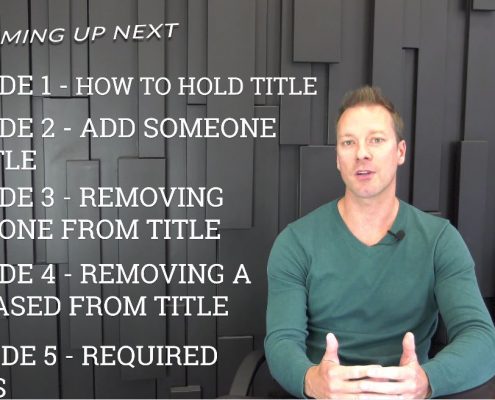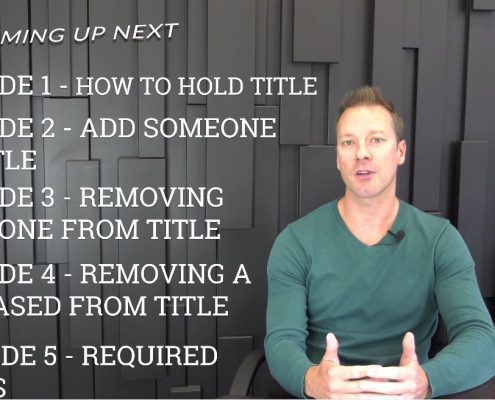Looking for answers to common real estate questions? Geoff Rabideau, Principal Lawyer at Rabideau Law covers various topics. View our videos and blogs below which cover frequently asked questions.
Videos
PATENT DEFECTS - Why are home inspections important?
Do I need a realtor if I’m selling my house to a friend or family member?
If you’re selling to a family member or friend, a real estate agent is not always necessary. However, we and other law firms would require an Agreement of Purchase and Sale, as would your lender. Truthfully, some lenders will require an agent to be involved in the transaction.
If you are on the fence about having a realtor involved, sellers have sometimes asked realtors to drop the commission rate. Also, hiring an agent may be helpful when determining a sale price, as they can provide a comparative market analysis. Realtors also have the experience of drafting clauses which crystallise the terms agreed upon between yourself and your family member, thus eliminating errors and misunderstandings.
Although a realtor is not necessary, it is a smart investment to protect the relationship between you and your family member.
When do I get my keys?
By the date of closing, the buyer’s lawyer will receive possession of the keys. Typically, this happens between 12pm-5pm, however there is no set time.
What is a statement of adjustments?
A statement of adjustments is a document that adjusts the costs to the day of closing.
- For an urban property, typical adjustments includes deposit and property taxes.
- For a condominium, additional adjustments would include condo fees or home owner association fees.
- For a rural property, adjustments could include propane tank rental and the propane within.
- For a rental property, typical adjustments would include any prepaid rent and current monthly rent.
- For a new build property, typical adjustments would include Tarion warranty, HST and HST rebate.
The purpose is to confirm the exact amount the seller’s lawyer needs to receive in order to complete the sale.
Holding Title on real estate
If two or more people are being placed on title to a property, you will have to decide whether title will be held as “Joint Tenants” or as “Tenants in Common”.
Joint Tenants
- Most common amongst spouses or where an adult child, a beneficiary, is placed on title with an elderly parent.
- With joint tenancy, if one of the owners dies, the other owner automatically become the sole owner of the property, a Survivorship Application will have to be completed and registered for the purpose of transferring title to the surviving property owner. Land transfer tax will be avoided with such Survivorship Application.
Tenants in Common
- Most common amongst business partners or where a parent is added to the mortgage, and title, to assist their child with qualifying for the mortgage.
- On the death of one of the Tenants in Common, the property passes to his or her estate (not the other owner) and then to the beneficiaries as indicated in their Will.
- If no Will exists, the deceased owner’s interest in the property passes to his or her heirs in accordance with the intestate succession laws for Ontario
- When a parent assists their child with qualifying for a mortgage, they must also be added to title to the property.
- In order to avoid encountering substantial land transfer tax, when removing the parent from the mortgage and title, when the child can qualify for the mortgage without the assistance of the parent, it is best to put the ownership of the property 99% into the name of the child and 1% into the name of the parent.
- This will result in only 1% of the land transfer tax being encountered at the time of the transfer.
- Conversely, if the parent and child were put on title as Joint Tenants, then when removing the parent from title and the mortgage, the result would be 50% of the land transfer tax being encountered.
For more information on how best to hold title please reach out to info@rabideaulaw.ca
I just bought a property, why are there two mortgages registered on my title?
On a refinance or a sale where there is a mortgage currently registered on title, the purchasing/refinancing lawyer reaches out to the lender/seller and requests that such currently registered mortgage be paid out and discharged from title.
In these instances, it is standard practice for the purchasing/refinancing lawyer to:
- Accept an Undertaking from the selling lawyer/lender
- Upon receipt of the closing/payout funds, the selling lawyer/lender undertakes to payout and discharge the mortgage from title
- Provides the purchasing lawyer with a copy of the registered Discharge of Charge
So, for a period of time, there will be two mortgages registered on title, the one being discharged and the newly registered mortgage. Most institutional lenders take about 60 to 90 days to discharge the old mortgage off title.






























